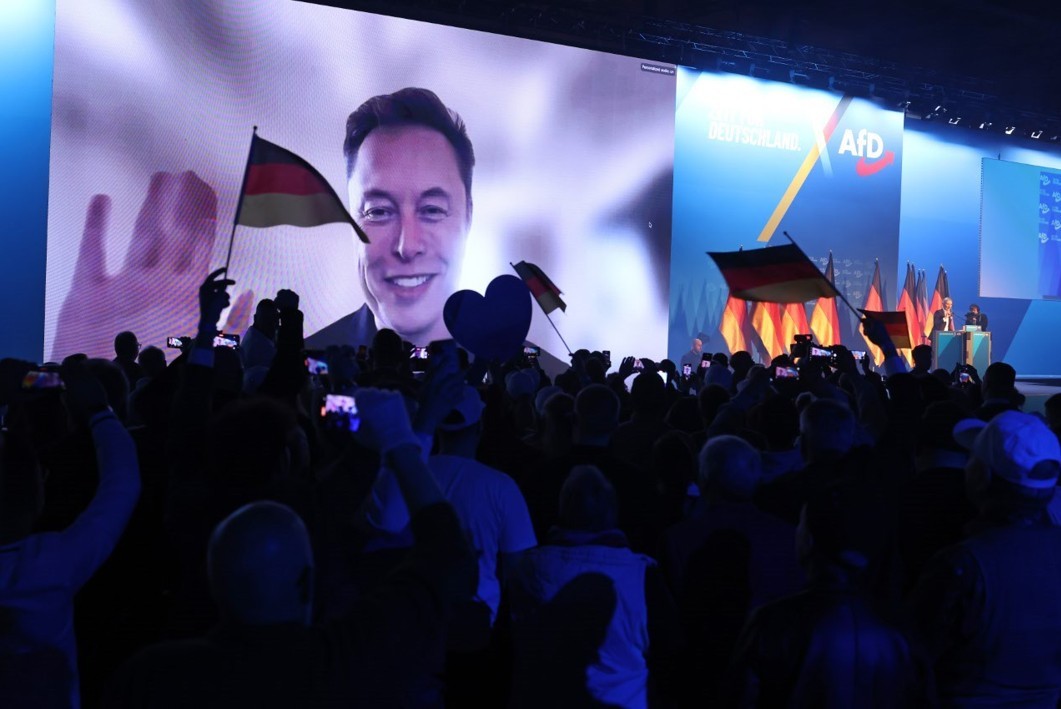Tesla Tumbles as Tech Surges; Musk's Political Stance Now Poses Big Trouble
While the market is rising, Tesla is struggling. The EV giant has dropped more than 6% this week as its sales tumbled in Europe, heightening concerns about its already fragile fundamentals. Even Musk'

While the market is rising, Tesla is struggling. The EV giant has dropped more than 6% this week as its sales tumbled in Europe, heightening concerns about its already fragile fundamentals. Even Musk's promises about AI and autonomous driving have failed to turn the tide.
Tesla's new car registrations in Germany plummeted by 59% in January, with only 1,277 vehicles sold—the lowest level since July 2021. Meanwhile, total electric vehicle sales in Germany rose 54% year-over-year in January. This suggests that the slowdown in demand is more due to Tesla's own challenges rather than a broader market issue.
There are several reasons for this decline. On one hand, the slump is partly due to the transitional phase of the new Model Y. However, a more significant factor is Musk's increasing involvement in political affairs. His clear political leanings and frequent controversial comments have alienated consumers.
With Germany's elections approaching, Musk has continued to support the far-right political party, Alternative for Germany (AfD), including public endorsements and online interactions with the party's leaders on his social media platform X. His frequent public political favor has angered many Germans.
As the CEO of Tesla, Musk is the face of the brand, and his influence has grown significantly after aligning himself with President Trump. However, this alignment means that he is becoming increasingly involved in politics, which has caused dissatisfaction among some neutral or politically opposed consumers.
Germany is not the only market facing challenges. In January, Tesla's new car registrations in France were just 1,141 units, down 63% year-over-year, the lowest level since August 2022. In the UK, Tesla's registrations were 1,293, a decline of 18%. Overall, Tesla's sales in Europe (including the UK) dropped 50% in January.
Tesla is also facing troubles at home. Data from the California New Car Dealers Association shows that Tesla's sales in California dropped nearly 8% in the fourth quarter of last year, with a 12% decline for the year. Model 3 sales specifically fell by 36%. Despite the beginning of deliveries for the Cybertruck, Tesla's overall sales continue to trend downward. Musk's vocal support for Trump and his denouncement of Democrats—who dominate California—has also caused dissatisfaction among local consumers.
Looking ahead, Tesla's growth may depend largely on the Chinese market. This is especially true after Trump's removal of EV subsidies in the U.S. and the strong performance of Chinese EV manufacturers. For example, XPeng's sales in January reached 30,350 units, a 268% year-over-year increase, capturing the top sales spot, while Xiaomi's SU7 model has seen sales exceed 20,000 units for four consecutive months. However, the growth in the EV market means increased competition, and Tesla has announced an 8,000 yuan insurance subsidy for the Model 3, along with a 5-year 0% interest policy, aimed at further stimulating sales. Given the ongoing trade tensions between China and the U.S., Musk, as one of Trump's most ardent allies, will need to tread carefully.
Some investors remain optimistic about Tesla's future, especially with the potential of autonomous driving and AI technologies. Even though Tesla's performance has been below expectations, stock prices have risen, driven by faith in Musk's vision. On January 29, Tesla reported quarterly revenue of $25.7 billion, up 2% year-over-year but significantly below the expected $27.2 billion. Operating profit dropped 23% to $1.58 billion. Nevertheless, Musk hinted that the full self-driving (FSD) version would be launched in the U.S. in June, and a supervised version of FSD will be rolled out in China and Europe later this year. Additionally, the Optimus humanoid robot could potentially generate more than $10 trillion in revenue in the future. These promises sent Tesla's stock up nearly 3% the following day.
However, as with Apple, the growth of software depends on hardware sales. If Tesla's fundamentals continue to deteriorate and car sales remain sluggish, investors will eventually become concerned. Currently, Trump's favorable stance toward Tesla provides only psychological support. In order to maintain market favor, Tesla must prioritize vehicle deliveries, and Musk must carefully manage his involvement in international politics to avoid further consumer backlash.
Disclaimer: The views in this article are from the original Creator and do not represent the views or position of Hawk Insight. The content of the article is for reference, communication and learning only, and does not constitute investment advice. If it involves copyright issues, please contact us for deletion.